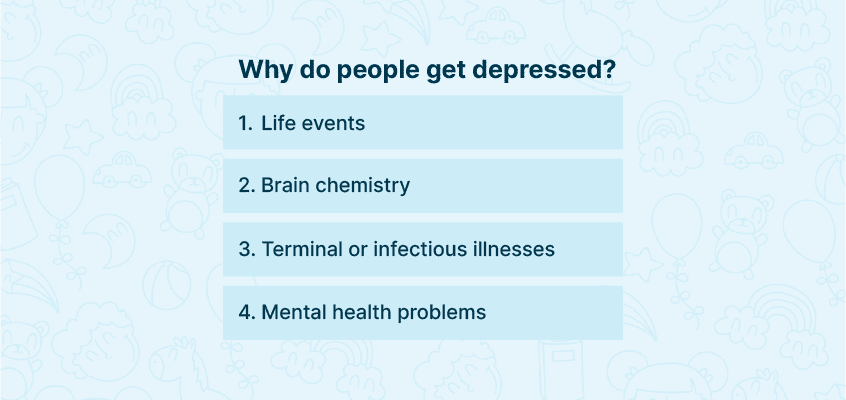Introduction:
Medical professionals prescribe SSRI and SNRI antidepressants to treat depression and anxiety. While these medications may also cause side effects that one may be unaware of, they are effective in helping with depression and anxiety. So what are these side effects, and how can people learn to manage them effectively? Let’s know about everything through this blog!
Our Wellness Programs
What Are the Side Effects of SSRI, SNRI, SDRI Classes of Antidepressants?
Antidepressants are a type of medication commonly used to treat depression. Mental health professionals also prescribe them to treat other mood disorders and anxiety disorders.
There are various antidepressants, including selective serotonin reuptake inhibitors (SSRIs), serotonin-norepinephrine reuptake inhibitors (SNRIs), and other antidepressants. However, it’s essential to know that different antidepressants have different side effects. The crucial thing is to understand that no medication is suitable for everyone, and some medicines that work for one person may not be beneficial for another.

Listing every possible side effect of antidepressants would be impossible because many factors are involved in how an individual will react to a particular drug. However, the most common side effects of SSRI, SNRI, SDRI class of antidepressants reported by patients include:
- Nausea and vomiting
- Insomnia or drowsiness
- Dry mouth
- Diarrhoea
- Blurred vision
- Changes in appetite
- Dizziness or fainting (primarily upon standing)
- Headache
- Lightheadedness or weakness upon standing up too quickly
- Sweating or chills
- Anxiety/nervousness/agitation/jitteriness/restlessness/dysphoria (feeling unwell)
Looking for services related to this subject? Get in touch with these experts today!!
Experts

Neelam Parwani

India
Life Coach
Experience: 5 years

Mansi Chawla

India
Psychologist
Experience: 12 years

Sapna Zarwal

India
Psychologist
Experience: 19 years
How Can We Avoid the Side Effects of SSRI, SDRI, SNRI Classes of Antidepressants?
Antidepressants are very common and seem to be the perfect solution when one feels depressed, anxious, or unmotivated. Although antidepressants are supposed to help reduce the symptoms of depression, anxiety, and other mental health conditions, many people on antidepressants suffer from adverse side effects ranging from drowsiness and headaches to sexual dysfunction. Here’s how to avoid these common side effects of antidepressants:
- Adjust the dose of the antidepressant.
- After consultations with the doctor, change the dosage timings.
- Seek counselling alongside medication.
- Start a physical activity or regular workouts.
How Do SSRI, SNRI, & SDRI Affect Your Body?
It is essential to understand the effects of antidepressants to avoid severe withdrawal symptoms. When taking antidepressants, the brain and body adapt to their presence. As a result, when the medication intake ceases, serotonin levels drop, creating negative symptoms.
As the human body adjusts to an antidepressant, it demands less serotonin because there is more available in the body at any given time. However, when someone abruptly stops taking an antidepressant, the brain still needs to be fed with a higher amount of serotonin than it gets from your body’s natural production. It results in severe withdrawal symptoms such as depression, anxiety, insomnia, and shakiness.
To sum up, antidepressants don’t just affect the body; they can change the structure and function of the human brain, which is why one must take them exactly as prescribed. Individuals may experience unwanted side effects they take more than the dosage they have named, including impaired thinking, increased anxiety, and suicidal behaviour.
What Are the Other Factors that Can Have An Impact On Your Health While Taking Antidepressants?
While the physical symptoms of depression are relatively well-known and understood, several other factors can have an impact on your health while taking antidepressants. The following factors can also affect your health while taking antidepressants:
- Anxiety and panic attacks
Antidepressants can cause anxiety levels to rise. It can be challenging to distinguish between symptoms like palpitations and shortness of breath which are side effects of the drugs, and those that indicate a full-blown panic attack.
- Poor sleep patterns
It’s common for people experiencing depression to have problems sleeping as part of their illness, so it’s not unusual for people to report disturbed sleep patterns when taking antidepressants.
- Pregnancy
Treatment with antidepressants during pregnancy is controversial due to possible adverse effects on the fetus. However, studies show that untreated depression in pregnant women can also be detrimental to the mother and the child. Thus, most doctors agree that treatment for moderate depression is warranted.
Are There Any Alternatives To These SSRI, SNRI, SDRI Antidepressants?
Are there any alternative medications to antidepressants? Yes, there are. A new study suggests that stress-reduction techniques such as yoga and meditation may be just as effective in treating depression as antidepressants.
Treating depression with alternative methods instead of taking a prescription antidepressant is an essential possibility for people who want to avoid medication’s side effects or simply do not want to take medication. There are a variety of alternative treatments that can help. However, these treatments may take longer to work than antidepressants, which is why we recommend consulting your doctor and following some medical advice even as you opt for alternative therapies.
Activities such as walking, exercise, and meditation have been shown in some studies to provide relief from depressive episodes. If one chooses to try an alternative method for treating depression, it is essential to talk to a doctor before doing so.
To Wrap Things Up!
We all know that doctors prescribe antidepressants to treat depression and anxiety in patients. Although these drugs can have side effects that many people are not aware of, doctors and other health professionals involved in your care can treat them if these side effects are detected and managed correctly. However, this has a lot to do with a patient’s reaction to specific side effects, so it’s best to ask a doctor about any possible side effects that one suspect is experiencing from taking antidepressants.
Are you looking for mental health experts? Our team at United We Care includes licensed depression counsellors and therapists who specialise in assessing, diagnosing, and treating depression and the symptoms of depressive disorder that you may be experiencing. Click here to learn more!
















